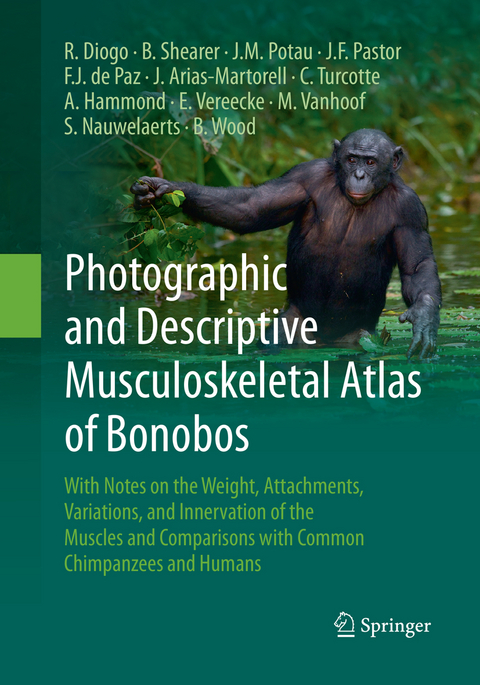
Photographic and Descriptive Musculoskeletal Atlas of Bonobos
Springer International Publishing (Verlag)
978-3-319-85319-2 (ISBN)
Chimpanzees, including bonobos and common chimpanzees, are our closest living relatives. However, surprisingly, the information about the soft tissues of bonobos is very scarce, making it difficult to discuss and understand human evolution. This book, which is the first photographic and descriptive musculoskeletal atlas of bonobos (Pan paniscus), adopts the same format as the photographic atlases of other apes previously published by the same authors. These books are part of a series of monographs that will set out the comparative and phylogenetic context of the gross anatomy and evolutionary history of the soft tissue morphology of modern humans and their closest relatives. The present atlas, which includes detailed high quality photographs of the musculoskeletal structures from most anatomical regions of the body as well as textual information about the attachments, innervation, function and weight of the respective muscles, is based ondissections of seven bonobos, including adults, adolescents, infants and fetuses, and males and females, and on an extensive review of the literature for comparisons with common chimpanzees. It therefore provides an updated review of the anatomical variations within chimpanzees as well as an extensive list of synonyms used in the literature to designate the structures covered here. Moreover, contrary to the previous photographic atlases of apes, it also provides details on neurovascular structures such as the brachial and lumbrosacral plexuses. The book will therefore be of interest to students, teachers and researchers focusing on primatology, comparative anatomy, functional morphology, zoology, and physical anthropology and to medical students, doctors and researchers who are curious about the origin, evolution, homology and variations of the musculoskeletal and neurovascular structures of modern humans.
Rui Diogo is an Associate Professor at the Howard University College of Medicine and a Resource Faculty at the Center for the Advanced Study of Hominid Paleobiology of George Washington University (US). He is the author or co-author of numerous publications, and the co-editor of the books "Catfishes" and "Gonorynchiformes and ostariophysan interrelationships". He is the sole author or first author of the books "Morphological evolution, aptations, homoplasies, constraints and evolutionary trends", "The origin of higher clades", "Muscles of vertebrates", "Photographic and descriptive musculoskeletal atlas of Gorilla", "Photographic and descriptive musculoskeletal atlas of gibbons and siamangs (Hylobates)", "Photographic and descriptive musculoskeletal atlas of orangutans", "Photographic and descriptive musculoskeletal atlas of a baby gorilla", "Photographic and descriptive musculoskeletal atlas of chimpanzees", "Comparative anatomy and phylogeny of primate muscles and human evolution", and "Learning and understanding human anatomy and pathology: an evolutionary and developmental guide for medical students".
Introduction and Aims.- Methodology and Material.- Head and neck musculature.- Pectoral and upper limb musculature.- Trunk and back musculature.- Diaphragmatic and abdominal musculature.- Perineal, coccygeal and anal musculature.- Pelvic and lower limb musculature.- Discussion: Discussion about the major evolutionary implications of our bonobo data, with a phylogenetic analysis and notes on chimp stasis and mosaicism, and how our data also exposes many just-so-stories on human evolution, e.g. by showing that muscles that were supposedly only present in humans and linked e.g. to our bipedalism, etc., are also present as variations in bonobos.- Index.
| Erscheint lt. Verlag | 1.8.2018 |
|---|---|
| Zusatzinfo | XIII, 262 p. 201 illus., 133 illus. in color. |
| Verlagsort | Cham |
| Sprache | englisch |
| Maße | 178 x 254 mm |
| Gewicht | 720 g |
| Themenwelt | Naturwissenschaften ► Biologie ► Evolution |
| Naturwissenschaften ► Biologie ► Zoologie | |
| Sozialwissenschaften ► Ethnologie | |
| Schlagworte | bonobo anatomy • Chimpanzees • comparative anatomy • evolution of chimps • Functional morphology • Pan paniscus • soft tissue morphology |
| ISBN-10 | 3-319-85319-8 / 3319853198 |
| ISBN-13 | 978-3-319-85319-2 / 9783319853192 |
| Zustand | Neuware |
| Haben Sie eine Frage zum Produkt? |
aus dem Bereich


